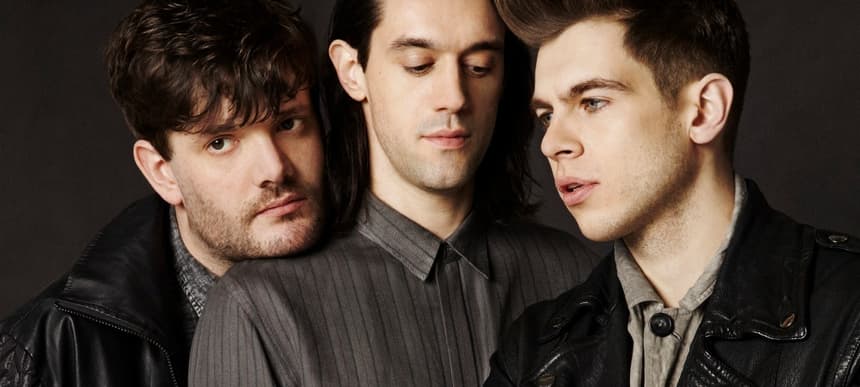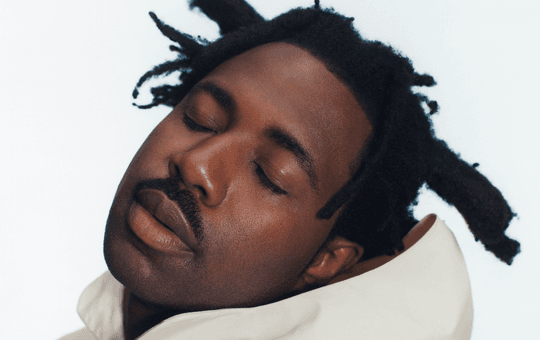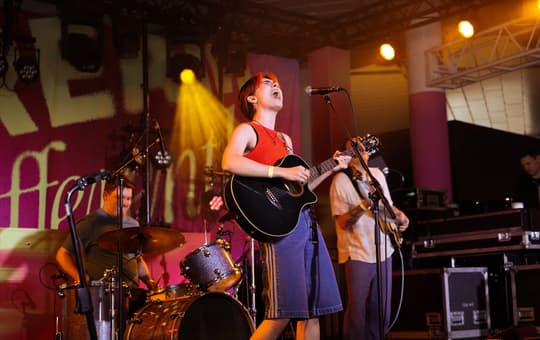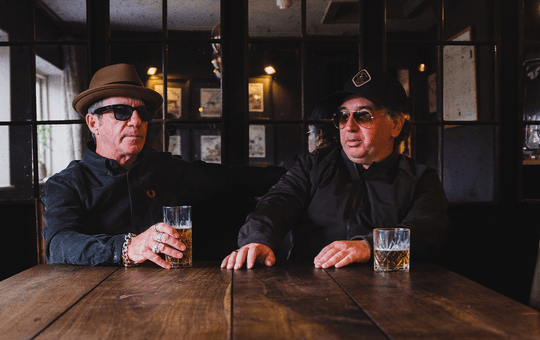
Klaxons interview: "So metaphysically bullshit."
Klaxons never seemed like they had any idea of what they were doing, yet they somehow managed to do pretty well for themselves. They were three guys who wrote some scuzzy dance punk songs while living on the dole in South East London – but they were also a pop band whose debut album ‘Myths of the Near Future’ put those very same songs at No. 2 in the charts, sold 350,000 copies, and won the Mercury Prize. They were a band that inadvertently started new rave, a legitimate youth subculture loathed by ‘proper’ critics that crossed over into the mainstream to enable a multitude of DIY bands to find an audience (if only briefly).
They probably would have done very well for themselves if they’d been allowed to continue unhindered, but for whatever reason their second album, in its original form, was never allowed to see the light of day, and the band hit their first significant stumbling block. When their official second album ‘Surfing The Void’ was eventually released in 2010, it felt like it arrived a year too late. A decent but inconsistent record, ‘Surfing The Void’ was met with a warm critical reception at the time, but it never crossed over with the same success as ‘Myths of the Near Future’, and has since been retconned into something of a flop. (For what it’s worth, some of the sessions from their aborted second album were released as the ‘Landmarks of Lunacy’ EP, a brilliant collection of songs and a valuable artefact that hints at what might've been.)
Third album ‘Love Frequency’ arrives four years since their last, seven since their first, and nine since forming. When we meet to talk about the album at a pub in North London, it’s on the cusp of the record’s release and the band are boundlessly enthusiastic, chattering over one another and seeming, well, happy. "We’re just incredibly invested in the present right now," says keyboardist James Righton, "We’re just loving absolutely every moment of it. Every interview, every bit of press. We get on better than we’ve ever done."
For ‘Love Frequency’, the band worked with friends and past collaborators like the Chemical Brothers’ Tom Rowlands, Erol Alkan, and James Murphy while recruiting new faces Gorgon City and even including some of their own productions to make a glassy-eyed dance pop record that retains the band’s penchant for quasi-mystical, evocative-yet-abstruse lyrics. There are some maddeningly hamfisted moments on it, but it also houses some of the best songs that the band have written, and it aims sky high. "The idea of it being on the radio was in the forefront. It wasn’t finished until we had the songs for the radio nailed," says frontman Jamie Reynolds, "That’s where we feel most natural. The first record had five, six songs on the radio." (True to form, he contradicts himself less than five minutes later: "We always make records for ourselves before we make records for anybody else. It’s not about pleasing anybody.")
Let’s talk about the album’s first single. It’s produced by Gorgon City – was it you who approached them initially?
Jamie Reynolds: "Yeah, we loved their track Real. They were just about to have a hit with Ready For Your Love…"
James Righton: "We’d not heard Ready For Your Love when we went into the studio with them, though. They hadn’t played it to us or anything."
Jamie Reynolds: "We were still writing tunes for the record, basically, and I think that once it was done we wanted to go strongest pop foot forward, and that was that song. I think it’s the most accessible song of the album. When the second record came out, there was a trend where you didn’t put out the biggest song first. There was a trend… [to James] What did they call it? What was it called?"
James Righton: [wearily] "Oh, God… it was… not a 'taster', but… It was the single that was like, ‘This is our edgy song.’"
Jamie Reynolds: "We put out Flashover in that period, and I think it was a disservice. There was this trend where you wouldn’t put out the most poppy thing. With this album, we thought we’d be coming out all guns blazing with the most poppy thing we’ve got, which was There Is No Other Time."
In the charts, it’s all very producer-led right now. Dance music seems to be more popular than ever, but you don’t get many bands doing a ‘dance-based’ thing, whereas when you started out there were a lot of bands doing that.
Jamie Reynolds: "I think there’s been an evolution, where electronic dance music has gone totally full circle and is now charging through the charts. And that field is where we wanted to position ourselves in the beginning. Now that it’s at the forefront, we feel comfortable working with that."
James Righton: "The whole idea of this album was not to be closed as a band, but experimenting and collaborating with people from all kinds of different fields within the dance genre. So we worked with people whose music we loved, and who had taste, but we weren’t ever afraid of collaborating. That’s how you develop as a band – learning new tricks off new people like Tom [Rowlands] and Erol [Alkan].
"And working with these people was great, because you do a couple of days with them and then you disappear, and you do a couple of days with someone else on a different track, and that’s how the whole album developed. It seems like a growing trend – I spoke to someone else in a band the other day and they said that there are so few actual producers who make whole records with bands these days. You have James Ford, Paul Epworth, or Dan Carey who do the majority of bands now. Even then, you do tracks rather than whole albums."
This is the first time you’ve worked like that, having different producers rather than one person steering it.
Jamie Reynolds: "We had a big pot of demos written, and the idea that we wanted to make a dance-led record. We drew up a list of names [of producers we wanted to work with] and contacted all of them, and we were lucky enough to have them all come back and say that they were up for doing it. There was no closed scenario where we wanted to go one way or the other. The idea of us not being scared to collaborate is probably the main thing on this record – just opening it up and not being scared to try different stuff."
James Righton: "There could’ve been a point where maybe Tom would’ve made the whole record – but it also worked out that there were loads of people we wanted to work with."
Simon Taylor-Davis: "Initially it was James Murphy who wanted to do the whole thing, but he couldn’t for time reasons, so we started working with Tom. All these people are so ridiculously busy – Tom couldn’t work these few months, so we did stuff with Erol, and with Steve Dub."
James Righton: "I think it’s a really interesting time in music, because there aren’t many producers that you’d go and make the whole record with. Everyone has their own things going on – Erol, Tom; James Ford has Simian Mobile Disco. Everyone’s trying to slot in sessions with whichever band they like."
How much of an overlap was there with these sessions? How long did you record for?
Jamie Reynolds: "I think we started at the beginning of 2012, and went on until last summer. So it was 18 months."
How did your initial ideas for the record evolve throughout that time?
Jamie Reynolds: "The evolution was that [at first] you’d open up a laptop, look at something like GarageBand, not know how to make music on it, [then] go to people who are literally at the top of their game, and by the end know how to self-produce our own single. Show Me A Miracle is our own production. That’s what we wanted at first, but wouldn’t have been able to do, so we had to go through the process of learning from everybody. The album, safe to say, is a writing and production record, as opposed to our last, which was a performance record."
James Righton: "There are four tracks on the album that we were heavily involved in on a production side: Liquid Light, Invisible Forces, Show Me A Miracle, and Atom to Atom. We still needed help – an engineer that could help us get all the sounds in place…"
With everyone being described as a “producer” nowadays, I think everyone has forgotten that engineers exist.
Jamie Reynolds: "Totally."
Simon Taylor-Davis: "Steve Dub, who we worked with, is The Chemical Brothers’ engineer. A phenomenal guy, we learnt an awful lot off of him."
James Righton: "And it’s a fine line of whether you’re an engineer or producer. What is production? An engineer could have a great idea, or get a sound for you that’s instrumental for the song, and is that not production?"
Do you think it’s harder today to be a ‘rock band’, basically, but with ties to dance culture?
Jamie Reynolds: "Our experience of that – I’m not sure. I don’t think ‘rock band’ ever really applied to us, because we were kind of a punk band, and then we went to work with Ross Robinson where the word ‘rock’… well, I guess it does apply to him, but I think of him more as a punk guy than he is a rock guy."
James Righton:" Yeah, because if you think about the records he made that we liked, it was like At The Drive-In, which aren’t rock records really – they’re punk."
Jamie Reynolds: "But to have a punk element in electronic music, is it harder? I dunno – it depends on how good your drummer is."
Simon Taylor-Davis: "It’s a little more blurred now – even going to watch bands like The Rapture, they definitely leant more in the band direction, mimicking electronic music, rather than having full-on electronic elements."
James Righton: "The dance element with those bands would come from the hi-hat, the kick, the cowbell. It would be in the funk bassline, the octave synths."
"To have a punk element in electronic music, is it harder? I dunno – it depends on how good your drummer is." – Jamie Reynolds, Klaxons
I’m not necessarily talking about dance music on a sonic level. I remember that you guys would tour so much, and could play a gig one night, a clubnight the next.
James Righton: "Yeah – we played I Love Techno, and then we went and played Reading Festival…"
Simon Taylor-Davis: "We were talking about this recently with Rory Phillips. He was there at so many of those shows, and we were talking about how blogs now are what clubs were. When we used to go down to Trash, we used to go there to hear new music that you didn’t hear on the internet. You went there to hear new tunes. And we played there, and people had that spirit. You’d go to those nights because you trusted the promoter, you trusted that whatever you saw there would be good. And I think to an element, certainly we’ve sensed that that’s vanished a bit – with bands playing, anyway."
James Righton: "It’s quite funny, because when we first started, I think we probably infuriated some people who would be like, ‘This isn’t rave! This isn’t dance music!’ But it was our interpretation. We weren’t a dance band per se, as in an electronic dance act, but we embraced the things about dance music culture that we loved."
Jamie Reynolds: "Even in London, though, it’s safe to say that there aren’t those clubnights anymore. You ask where’s there a scene right now, and it’s in house music – there isn’t that culture of bands with guitars going on, it’s about young DJs coming out of South London, playing warehouses."
James Righton: "It’s expensive being in a band. Way cheaper buying a laptop."
Right, that’s a major thing. People think being in a band has gone out of fashion due to… well, that it’s just gone out of fashion, that it’s a cyclical thing. But it’s the prohibitive cost of doing it, among other things.
James Righton: "Living in London, even when we started, was expensive for us being on the dole in New Cross. We somehow managed it. Now, it’s a lot more expensive to live in New Cross than it was when we started. In East London, or in Dalston, it’s been pushed out even further."
And as the areas become more desirable to live in, it becomes harder and harder to write there, as you can’t make any noise.
Simon Taylor-Davis: "Some of our friend’s bands now have rehearsal spaces in Leyton. They were in Seven Sisters before. It’s just going further and further north. We’ve spent our whole entire existence as a band trying to be able to afford to buy, or at least rent, a rehearsal space. We haven’t found it in nine years."
Jamie Reynolds: "I had one, but because I sacked it off, we’ve been cursed by the fact that we can’t find one."
James Righton: "We should’ve just kept the one in New Cross."
Jamie Reynolds: [dejectedly] "It was mine, and I sacked it off…"
James Righton: "How much was it a month?"
Jamie Reynolds: "I can’t disclose that." [laughs]
"Some of our friend’s bands now have rehearsal spaces in Leyton. They were in Seven Sisters before. It’s just going further and further north. We’ve spent our whole entire existence as a band trying to be able to afford to buy, or at least rent, a rehearsal space. We haven’t found it in nine years." – Simon Taylor-Davis, Klaxons
To try and close off my original line of questioning a bit – do you feel like that world where the band scene and the club scene intersect has closed off a bit?
Jamie Reynolds: "We’re not the right people to ask. We’ve been searching for it. We’re looking for a support band – if we have a show, we think, ‘Who’s gonna play with us?’ Just wishing it was more obvious to choose."
James Righton: "That’s not to say there hasn’t been great acts over the last few years. Factory Floor’s record was one of the records of last year, it’s incredible. And that’s a band making exciting, interesting dance music, but who are still a band. There are bands about – but I don’t know if there’s anyone who’s matched when we had an initial want and desire to cross over to the mainstream as well as being a dance band. We wanted to write pop songs – I don’t think there are many bands doing that."
Jamie Reynolds: "There was the infrastructure. When we started, we already had a handful of club shows, but that’s because our friends were running those clubnights, and those clubnights were already busy. We just joined in with a culture that already existed and set ourselves up before we’d even started."
There’s a lot to do with dance on this record. It’s not the whole record, but it’s a part you can’t ignore. Do you still go to clubs at all?
Jamie Reynolds: "We only really go to clubs when we DJ. Or when there’s something really exciting that’s a one off – like DJ Harvey playing here last year for the first time in ages. But on the search, on a weekly basis? I think that’s best left up to the kids in Peckham."
Let's talk about some of the less dance-based stuff on the record, then. I remember you released that little EP, ‘Landmarks of Lunacy’. And I always thought that was a really interesting direction…
Jamie Reynolds: "Yeah, thank you. That was…"
James Righton: "That’s one of our favourite…"
Jamie Reynolds: "It’s the best piece of work we ever made."
Simon Taylor-Davis: "We thought it was brilliant."
Jamie Reynolds: "We thought it was our best piece of work."
James Righton: "And there’s another five tracks from it that no one ever heard."
Jamie Reynolds: "That album – people want to hear that record, [and] I don’t think that half of them know that half of that record already exists. It’s already out there. And the other half of it is excellent, and we should just put it together and give it to people quite soon, I’d imagine."
James Righton: "It would’ve been interesting if we’d released that as our second album, and seen what the evolution of the band would’ve taken. It’s hard to say, in hindsight."
Simon Taylor-Davis: "We recorded it, we finished it, and we all absolutely loved it. And for whatever reason, it didn’t come out. And that was… We put out heart and soul into that."
Jamie Reynolds: "That was our most creative work. Incredibly creative."
I brought it up because of the song The Dreamers on the new record, which seems like a continuation of what you started with those sessions.
Simon Taylor-Davis: "It sort of nods to it."
James Righton: "I think that Marble Fields was the best song we’ve ever written. And that whole period, that whole time with us three and James Ford down in the middle of nowhere in France, literally not a care in the world but just blowing each other’s minds and pushing each other and making weird music that was trying to do stuff that you wouldn’t normally do, whether that’s odd chord structures or melodies that were weird, or lyrics that are so bizarre and colourful… It was fun, magical, and one of the best recording session times that we’ve ever had."
"It’s the best piece of work we ever made." – Jamie Reynolds, Klaxons on their unreleased second album
Did knowing that it never came out make you reconsider things?
Jamie Reynolds: "That was just a period of madness. We work very hard – we write songs constantly and we have done over the past nine years, just continuously writing songs. How that affected what we were doing? I dunno. We went from the idea of something being mad to going on another mad trip. We constantly change what we do."
Did you have tensions in the past?
Jamie Reynolds: "We had those continuously, from the beginning. But over the past six months, it’s been completely…"
James Righton: "The journey we went on – the success, the mad chemistry that we’ve got between us, which could explode at any moment…"
Jamie Reynolds: "…from day one."
James Righton: "That’s always been present. But right now it’s just super cool, and we’re really enjoying it. We love being in each other’s company, and that’s just a great thing."
Were you overthinking things in the past?
Jamie Reynolds: "Fuck yeah. Have you looked at our lyrics?"
James Righton: "Fuck, every day."
Jamie Reynolds: Fucking everything. Every single thing."
James Righton: "There was one point where we’d hire a studio or rehearsal room and where we wouldn’t touch an instrument. We’d sit there for eight hours, talking. It was just so metaphysically bullshit."
Jamie Reynolds: "Paying to sit there and talk about shit."
Simon Taylor-Davis: "When we began making this record, when we started working with Tom and finished the first track, Love Frequency, we sensed there was something there that was great. There was a reason for this madness. And we think that the results are stunning. We were really blown away by it."
"There was one point where we’d hire a studio or rehearsal room and where we wouldn’t touch an instrument. We’d sit there for eight hours, talking. It was just so metaphysically bullshit." – James Righton, Klaxons
See, I always got that vibe where you just steamrolled ahead, not thinking about anything at all.
Jamie Reynolds: "I dunno… It’s totally off the cuff. But we all care so much about what it is that we do that we want to love it."
James Righton: "It comes from worry, and wanting it, and it meaning everything to you. You just talk."
Simon Taylor-Davis: "It’s like Invisible Forces on the record. I actually sat there last night and got to listen to the whole thing, all printed, and actually just sit back and enjoy it. And Invisible Forces just sounds like the most effortless thing we’ve ever created – but we went round the house for two years with that. We did nine versions of that song with different producers. And the one we put on was the demo version, essentially! It’s just that kind of madness, going round in circles trying to create this effortless thing that sounds incredible is kind of the journey."
Akashic Records/Sony released 'Love Frequency' on June 16th 2014 (buy).













